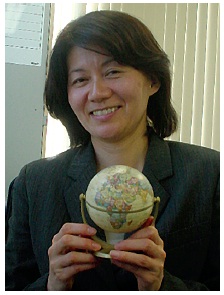KAORI KURODA is Co-Director of the CSO Network Japan, a non-governmental organization (NGO). She was previously at the Asia Foundation and the Japan Center on Japanese Economy and Business at Columbia University. She has a Master’s in Education from Harvard University. Born and raised in Kanagawa, she has also lived in New York, Boston and London.
WEEKENDER: What is CSO Network Japan?
KURODA: CSO Network Japan was founded in 1999 to help Japanese CSOs network with CSOs in other countries, and with organizations in government and business in order to make a greater contribution to solving global problems facing humanity. We are now trying to mobilize the Japanese public to focus on how to reduce poverty and enhance the dignity of people in all countries.
What are CSOs?
CSOs — “civil society organizations” — are voluntary organizations not directly controlled by the government or corporations. Many people may think that “NGO” and “CSO” are the same things, but NGOs are just one type of CSO. Think tanks, universities, and faith-based groups all fall under the broad definition of “CSO.”
What got you interested in NGOs and international development?
In 1984, after working for four years at Mitsubishi Heavy Industries, I decided to move to the UK, where my father was living at the time. While there, I got very involved in the local music scene. I played keyboard in a rock n’ roll band. Around that time, the music industry — led by people like Bob Geldof and Bono — was trying to use music to raise public awareness of important social issues. Songs like We are the World and Do they know it’s Christmas? and events like the Live Aid concert stimulated many people, myself included, to consider how we can make a difference in the world.
After returning to Japan, I started teaching Japanese to foreigners from various countries. I became friends with many of my students, and that helped me look at my own society differently and made me realize that Japan often does not treat foreigners very well. That made me decide to go into the NGO world.
There are many NGOs focusing on international development issues. What is distinctive about CSO Network Japan?
CSO Network Japan is unique in that it serves as an “interface” between the NGO community in Japan and other sectors, including the general public. It is also unique in that it has an extensive network with NGOs in other countries, especially in the U.S. and UK.
In Japan, NGOs, especially those that try to focus on international development issues, seem to have a difficult time becoming well established. Why is that?
Japanese NGOs face many issues. One issue is that Japanese organizations, and Japanese society in general, are organized in a very rigid, vertical way. As a result, there is very little horizontal interaction linking government, corporations, NGOs and others. CSO Network Japan therefore tries to establish these horizontal linkages.
Another issue is that citizens don’t know how to participate in the system to address social issues. Unlike in many countries, citizens in Japan don’t know how to make their voices heard. So CSO Network Japan is trying to create vehicles that encourage public participation in resolving important social issues.
In addition, Japanese tend to not politicize issues. That makes it harder to directly identify issues and to bring pressure to bear on resolving them.
What lies ahead for CSO Network Japan?
In 2005, we, together with some like-minded groups, will launch a major campaign to mobilize people throughout Japan to think about global poverty. Working at various levels, we want to identify practical policy solutions to poverty-related issues.
What motivates you personally to dedicate your life to NGOs and the eradication of global poverty?
Before I die, I want to see that my efforts have made some contribution to positive changes in the world. Although I am, in many ways, a traditional Japanese person who is rather quiet, at the same time I would like to be a “change agent” who can help resolve social issues in both Japan and overseas.
CSO Network Japan’s website is www.csonj.org.









